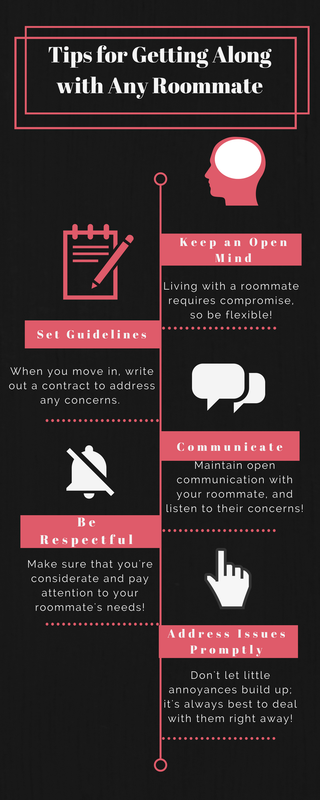College Roommate Tips
Why You Should Have at Least One Roommate in College
Everyone has heard a college roommate horror story that has made them cringe and rethink even considering having a roommate now or in the future. However, having a roommate has multiple benefits that could overrule many of the issues that you are thinking of when it comes to having a roommate. If you are considering having a roommate in college and are currently on the fence on whether having a roommate is worth the possible trouble, consider the following reasons of why you should have at least one roommate in college:

Having a roommate lowers the cost of your rent (and other common household costs)
It is no secret that the cost of a college education is frighteningly high, especially when you think of its associated cost. The tuition cost may be high enough, but when it comes to paying for housing, the added cost may be enough to have you reconsider if having a roof over your head is worth the financial struggle. Instead of struggling with financial aid disbursement or paychecks from your jobs - you might want to consider getting a roommate to lower the cost of your monthly rent.
Think of the amount of rent you currently pay or are looking to pay, then cut it in half when you get one roommate (you can cut it even more when you get multiple roommates). You don't have to make paying rent near impossible when you add one or more roommate to cut the cost of your monthly rent - it's one of the many costs that are minimized when you add at least one roommate.
Having a roommate in college with also help you minimize other common household costs. Renter's insurance, monthly utilities, the security deposit are all cut down when you get to split it between multiple roommates - you won't have to shoulder the total cost of multiple fees when you have multiple roommates.
If you are going to be living in an off-campus apartment that is typically going to be unfurnished, having a roommate (or more) will also allow you to cut the cost of furnishing your apartment. Some roommates will already have some furniture to contribute - a dining table set or sofa - or be willing to chip in or buy it for themselves.
Having a roommate will give you a friend (maybe more!)
This benefit will vary depending on the type of person you are and the type of person you are going to be living with is, but having a roommate will allow you to have another friend. You won't have to spend days and nights alone when you have a roommate, and you can have someone to seek out when you need help, or even just someone to talk to.
Having a roommate will especially help if you find yourself scared of being alone at night in your own space, or uneasy when you leave your apartment unsupervised for an extended amount of time. Chances are, your roommate will be at home at least one point, or multiple points, when you are not at home during the day or night.
You can plan roommate dinners or outings if you want to get to know each other better, or simply to spend time together. However, it's important to remember that some people prefer to draw a line with roommates to keep them as acquaintances rather than as close friends, and that is completely okay. Respect their preferences. You and your roommate(s) may not be extremely close best friends, but having a constant presence in your living space will be comforting enough.
Having a roommate is a college experience - make your own crazy roommate story
Regardless of whether all of the college roommate stories were horror stories or "cool" - they were somebody else's stories, not your own. You'll never know the type of experience you'll have and like any other life experience - you'll live and you will definitely learn from having a roommate in college.
Your college roommate may end up being your best friend. They could be the type of person that will be the focal point of many crazy college stories: all-night cram sessions during finals weeks, or nights of bar-hopping and ending up at your local diner at sunrise. Or your college roommate could end up being your own worst enemy. They could leave all their dishes in the sink and refuse to take out the trash themselves despite your constant begging.
You will never know the experience you'll get from having a roommate in college, but it really is worth the shot. Not only will you cut the cost of your rent and the costs typically associated with housing, and gain a friend, but you will come out with plenty of stories to tell later on. Whether they are horror stories or memories recounted with a fond smile - it's up to you to find out.
Guide to Living with a Roommate After College
Given the rising cost of housing nowadays, it’s likely that you will have to live with a roommate, even after you graduate from college. If you were a college student, you probably already have some experience living with a roommate. In many ways, living with a roommate after graduating is similar to living with a roommate in college. You still need to adhere to the basic rules of sharing a space with someone else, such as: communicate your expectations to each other early on in the relationship and respect each other’s personal space. But living with a roommate after graduating is different in many ways, too. For example, it might be more difficult to memorize your roommate’s schedule, since a full-time job schedule might not be as regular as a college student’s class schedule. Now, let’s talk about some tips for living with a roommate after graduation. We’ll start by discussing the similarities and differences between living with a college roommate and a post-college roommate.
Here are some ways your roommate relationships change after graduation.

You need to be considerate of your roommate’s financial situation
In college, it’s almost like everyone is equally poor, so both you and your roommate try hard to save as much money as possible. However, after you graduate and you dedicate your life to a full-time job, there is a greater chance that there will be a discrepancy between your income and your roommate’s income. If you make more money than your roommate does, be considerate of her financial circumstances. For example, don’t push her to pay extra for things you don’t necessarily need (like faster Internet, if the Internet you already have works just fine), or if you can contribute a little bit more to the grocery fund on a certain week, do it. Of course, if she is on board with any extra expenses, that’s a different story. Just don’t force her to do something that will cause financial strain for her. Yes, there is only a slight chance this will happen, it’s possible you and roommate will have similar financial situations. But money is an extremely sensitive topic, especially now that you are making your own and not depending on Mom and Dad anymore.
Job schedules can be more unpredictable than class schedules, so don’t expect to memorize your post-grad roommate’s schedule
In college, you and your roommate had classes or club meetings at the same time every week. It’s easy for your roommate to memorize your schedule and to know where you are at almost any time. For example, if it’s 10 a.m. on a Tuesday, your roommate will know that you are in your biology class, and if it’s 2 p.m. on a Wednesday, you will know that she is in her psychology class. This is helpful, as your roommate will know when to expect you back in the room. She will know when she has the room to herself, and she will also know when to call for help if you don’t show up at the room. As a college student, your schedule is relatively the same from week to week, so it’s easy for your roommate to memorize and to know where you should be.
On the other hand, when you have a full-time job, your schedule (and your roommate’s) can be more unpredictable. This is especially true if one of you has an “on call” job, or if you need to pick up various shifts at different times throughout the week. These unpredictable schedules mean it’s harder to know if she is in the apartment at any given moment. Of course, if you would like, you can solve this issue by using resources like Google Calendar and syncing your calendars. But more often than not, post-grad roommates do not need to memorize each other’s schedule. Don’t expect to know your post-grad roommate’s schedule or where she is at any time.
You don’t know how much time you have together, so enjoy the time you do have!
College roommates usually stay in the same room together throughout the course of one academic year. Of course, there are exceptions, some roommates stay together for a longer or shorter time period, but one year is the norm. Even if you no longer live together, you are likely to still see your roommate around campus, too, so it’s easy to keep in touch with them.
But after graduation, there is no timeline. Usually, any roommate can leave at any time, as long as they find someone to replace them in time (this is to keep the remaining roommate from having to pay the entire rent herself). At this age, the world is at our fingertips, and we don’t have much tying us down to any specific place, so why not accept an amazing opportunity somewhere else? This means that you don’t know how much time you and post-grad roommate will have together.
If you like your post-grad roommate, cherish the time you have together because when the world is at your fingertips, nothing is certain!
Exchange emergency information with your roommate
Many people don’t think to do this, but it is important for your roommate to have your emergency information. Back in college, your school had your emergency information. If there was ever a problem, the school could contact your parents. But now that you’re not in school anymore, what will you do if something happens to you and your roommate doesn’t know how to reach your family? For that reason, I suggest that your roommate should have a few basic pieces of information, such as:
- A list of all your allergies, and what to do if you have an allergic reaction.
- Any medical conditions you have that she should be aware of, and what to do if you have an episode. For example, if you have epilepsy, what should your roommate do if you have a seizure?
- Your doctor’s name, office address and phone number.
- A phone number where she can reach your family.
Of course, you might not feel comfortable giving all that information to your roommate, and that’s okay. At least give her a phone number where she can reach your family; that should be enough to help during an emergency situation.
You probably won’t be super close to your post-grad roommate
Yes, they tell you in college that you don’t have to be best friends with your roommate. The same thing rings true for a post-grad roommate. In college, it’s easy to bond with your roommate over having a similar “college experience” at the same school. Not so with a post-grad roommate. It’s harder to find things to bond over, especially if your lifestyles are very different. This is not a bad thing, it is just something to think about when having a post-college roommate.
Now that we have touched on the differences between a college and a post-college roommate, let’s talk about the similarities between the two. There are many similarities, because after all, you are still sharing a space with someone. Here we go!
You can find a post-grad roommate the same way you found a roommate in college
Maybe you can’t use your university’s roommate matching system anymore, but you can use many other roommate search tools that are also popular with college students. Of course, whenever you find a roommate over the Internet, you should try to meet with them in person first. This is just to make sure they aren’t creepy scammer!
Don’t forget that you can also utilize your “in real life” circle to find a roommate. Ask your friends, family members, or co-workers if they know of someone who is looking for a roommate. After all, wouldn’t you be more comfortable rooming with someone your co-worker or friend can vouch for, rather than a stranger you met on Craigslist?
Finding a post-grad roommate isn’t that hard after all!
Be clear about your expectations
Whenever you live with a roommate, whether you are in college or if you are already graduated, most roommate problems arise from unmet expectations. To avoid these problems, be clear about your expectations. Although it might sound “college-y”, you should consider drafting a roommate agreement with your post-grad roommate. Even if you decide not to write up an agreement, you should at least discuss a few things, such as:
- How will you split the rent? 50/50? Or does the one with the bigger room have to pay more?
- How will you split the household chores? Will you have a chore schedule?
- Will you share food? Will you share only certain foods, like the gallon of milk and the dozen eggs? If you do plan to share food, who will pay for it?
- What items, if any, can your roommate borrow? Under what conditions can she borrow them? For example, can she borrow your hair straightener if only if she asks you first and puts it back where she found it and in the condition she found it?
- What’s the policy for noise and for guests? Especially overnight guests of the opposite gender could be a problem, and so could loud music in the early hours of the morning.
- Will there be any alcohol in the apartment? This might be an important question for someone who would rather live in a substance-free environment.
It’s best to discuss your expectations of each other early in the roommate relationship. Preferably, you should have these ground rules established before any major issues between you and roommate arise.
When problems arise, face them head-on. Do not be passive-aggressive
Leaving passive-aggressive sticky notes on the bathroom mirror or on the fridge is SO four years ago. Be an adult, don’t do it! If an issue arises, don’t be passive-aggressive about it. Instead, be upfront and face the issue head-on with your roommate. For example, if your roommate is always eating your food even though you’ve already established that you wouldn’t eat each other’s’ food, don’t leave a sticky note on the fridge or send a snarky text about it. Rather, kindly remind her of your agreement.
Being upfront about an issue is a much more effective way to solve problems than being passive-aggressive.
Respect the common area
Now that you’re not living in a cramped dorm room, it’s likely your apartment will have a common area shared by you and your roommate. Please be sure to respect this common area. Do not leave a mess in the living room or kitchen. Especially do not leave your dirty dishes piled up in the kitchen sink or your stinky sneakers and socks in the living room (yes, I had a friend who lived in a multi-bedroom apartment with a roommate, and her roommate would STILL do things like that). This space is just as much your roommate’s as it is yours. Respect her right to have a clean living environment by respecting the common area.
Even after you graduate from college, you might have to live with a roommate. But now that you are out of college, some things are different. For instance, a college student’s class schedule is much more predictable week by week than a full-time worker’s schedule. Sometimes, full-time workers are “on call” or have to pick up extra shifts, so their schedules are not as predictable. This means that although you knew when your college roommate would be home, you might not know when your post-college roommate will come home.
However, with a post-college roommate, you should still follow the same general rules you followed with your college roommate. For example, communicate your expectations to each other early on in the relationship, as this will help prevent problems. Also, respect your roommate’s space and privacy. All in all, whether you are still in college or not, you should treat your roommate the same way you want to be treated, with kindness, consideration, and respect.

How to Create a Cohesive Home When You and Your Roommate Have Different Tastes
By Julia Dunn
When I moved into the residence halls at UC Santa Cruz, I was extremely curious about who my roommates might be. I had all kinds of questions random for them: what are you hoping to study? What do you do for fun? Where did you grow up? Who are your favorite musicians? Do you want to get matching college t-shirts? Will we go to the dining hall together? Are you excited about college? Do you want to be best friends? But I didn’t think to wonder about their style when it came to room decor and other logistics of sharing a close space.
Having no siblings, I never had to share a room with anyone when I was growing up, and I was eager to live with people who could be 24/7 friends. I’d always decorated my spaces just the way I wanted to, without needing to correspond with anyone else about it. When I arrived at my dorm room and met my two roommates along with their families, it occurred to me we’d need to establish a plan for decorating the room in a way that suited the three of us. This would be an interesting challenge.
It can be difficult to negotiate room decor with roommates, particularly if you don’t know them very well (or if you have more than one). Your home environment is important to everyone, and you certainly don’t want to spend time in a space that doesn’t reflect you. Worse, you don’t want your home environment to bother you; I knew people in college who, for various reasons, hated being in their dorm room and consequently spent lots of time in communal lounges, coffee shops around campus, and library study rooms, avoiding their dorm.
In college, your dorm room is the main area in which you can seek solace and (sometimes) privacy, although residence hall living doesn’t lend itself to much privacy. Knowing that, it’s in your best interest to keep communication open between you and your roommates--at all time, of course, but especially in the first few weeks of school when you’re unpacking all the posters, photos, bumper stickers and wall decorations you packed from home.
Here are some strategies for working out room decor when living with roommates:
Have a brainstorming session together
Cooperation is crucial if you want to create a cohesive home. Sit down with your roommates and see if there are any obvious ways in which you can combine or blend all of your styles into a sensible new one. It can be useful to physically map out everybody’s design ideas so that everyone has a tangible sense of the options available.
There are several ways in which to go about mapping out decor. You might draw out possible layouts on a whiteboard, create a vision board-style collage, or even use online tools and apps that let users place furniture and wall art around a room while being easily able to change layouts with the swipe of a finger.
During this brainstorming session, it may be smart to find out what decorative items your roommates brought with them to college and would like to incorporate into your dorm or apartment in some way. Sharing items during the brainstorming process can help you all determine whether you’ll need/want to buy anything to unify existing decor or better incorporate everybody’s decorations.
If it turns out you and your roommates have clashing styles, “all is not lost,” says an article by downlinens.com. “Head to the library and scan through their decorating magazine archives for inspiration on how different esthetics can be combined successfully. When done properly, mixing and matching can give a room some personality and make it feel less cookie-cutter than a uniform room”
Be vocal
If you are silent about your vision for a shared room or apartment, you surrender your decision-making power. Be clear about how you would like the room to look, and allow others to voice their opinions as well. You might fiercely disagree with hanging up your roommate’s celebrity poster on the bedroom door, but if you don’t say anything, you’ll be staring at the blown-up face of Justin Bieber for months on end, which will likely invite daily middle school flashbacks.
If you decide to blend your styles or collaborate on a plan for decor, you may find later on that some ideas don’t sit well with everyone after all. Dormdecor.com suggests “giving each other three vetoes on decoration choices so no one has to live with a creepy doll or an offensive fridge magnet that will make the dorm room a space of tension.” Discuss with your roommates how you would like to handle disagreements in a stress-free fashion.
Shop together
It’s easier to stop your roommate from buying that hideous brown table when you’re actually in the store with them, as opposed to freaking out about it at home after the fact.
If you and your roommates are having trouble visualizing what each person would like the room to look like, get out of the dorm and into a department store. This way, you can wander through the college section and decide on things like lamps, side tables and even shared appliances. You wouldn’t necessarily think of coffee pots and microwaves as part of room “decor,” but when you’ve got three people in a room that was built to be a double or single room (the housing crisis on college campuses is real), even the smaller items stand out.
It’s usually best to shop in the “back to college” sections that most stores feature during August and September when universities begin their fall terms. Furniture is usually cheaper in these sections versus regular furniture sections, and it’s also designed with dorm living in mind. Perhaps you and your roommates will discover some new pieces that please all of you, no matter the pieces you may have been arguing about back in your room.
Before you even set out to shop, make sure you have discussed budgets with your roommates, and don’t assume any or all of your roommates will even be able/willing to spend money on decor. Check in with everyone beforehand so that you don’t put anybody in an uncomfortable situation, especially if one of you is really tight on finances and cannot participate in any shopping to begin with.
Make sure you’re on the same page
Before you actually start pinning things to the wall and hanging twinkly lights all around the room, make sure your roommates are okay with it. You might find that you have roommates who couldn’t care less about decorating the place, or are otherwise apathetic about the whole prospect of putting effort into the style of the room. This shouldn’t give you license to design the whole space without their input. Make sure you talk with them about their preferences and needs; you may want to place an essential oil diffuser on top of a shared table, but your roommate may not be able to tolerate scents. It’s easy to forget that living with others in college requires some sacrifices if you aren’t used to sharing close spaces.
Section off parts of the room/house
In my first year of college, when I had two other roommates, we ultimately decided to section off parts of the room that corresponded to the space beside our respective beds. I decorated the area above my desk and top bunk bed, as well as the dresser and side table I was given (each roommate was given the same furniture by the housing office).
Sectioning the room was useful because I was able to create my own little bubble in the areas where I slept, did homework, and prepared for class. I felt represented in the room in that space, and my other roommates did as well, because they were given the freedom to decorate their own mini-spaces.
While the room was pretty small, we did have a few common areas to decorate as a group, mainly tiny nooks and spaces between our furniture. We topped our mini fridge with a couple of potted succulents and set up a rotating fan to keep us cool on hot nights. We covered our door with flyers and small sheets about community events and student resources that could be useful for the three of us. This way, areas that we left undesignated for any one of us ended up serving a communal purpose.
Sectioning off spaces is also a great idea if you strongly disagree with your roommates’ sense of decoration; you’ll each have a fraction of the room to make all your own!
Useful tips from around the web:
● Mindbodygreen.com advises students not to get too hung up on single items they may not like that a roommate wants to use in the room: “It’s too easy to say, ‘No way, I hate that’ to another person’s tastes. If there’s a piece that one person owns or is adamant about buying, consider that it’s going to be only one of the elements in the room. As long as you’re not talking about a fuchsia rug or leopard-print curtains, most pieces can be balanced out by others. The sum is greater than any one part.” With this in mind, be cooperative and patient, knowing that you might need to make compromises for others. Be flexible! You’d want your roommates to give you the same kind of acceptance as well.
● Teen Vogue offers a useful tip to roommates whose styles aren’t inherently compatible: “find a base color you both like. Incorporate that color throughout the room, and everything will look unified.” This grants you permission to hang a series of sunflower photos if your roommate insists on a goldenrod body pillow and lemon-print sheets.
● “Decorate with a roommate, not against.” downlinens.com emphasizes that “your roommate is your partner. Like it or not, you’re in this together for the long haul—or at least the semester.” Don’t become too dominating during the room decorating process if you can help it; coming off bossy from the beginning will surely cause you roommate problems in the future. The worst thing you can do when sharing a room with others is alienate your roommates or create a hostile environment. It isn’t good for you, it isn’t good for your roommates. Nobody wins.
You’ll more than likely find that room decor can be a great first source of bonding, a reason for collaboration that can help you and your roommates become closer friends. Decor is usually exciting for college students because it allows them a chance to express themselves in their independence from their hometown. It also helps to establish themselves in a new era of life. When your buddies from down the hall come over to your room, they’ll get a bit of your essence and personality based on the colors and feeling of your space. Thus, you’ll want to put some energy into it, and decorating is always more fun with other people around!
However, at the end of the day, do not be discouraged if your room does not end up looking 100% you. After all, it’s only supposed to be ⅓ you, if you have two other roommates. You might spend hours working on a set of decor ideas that ultimately doesn’t totally capture your style. That might also be the case for your roommates. This is not the end of the world, fortunately. You will undeniably move multiple times throughout college, in and out of dorms, and eventually, into a larger apartment (which grants you much more decorating space to play with!) One day, you’ll have your own home to style however you please. Don’t take your first dorm room or apartment decor too seriously. The style you come up with collaboratively between you and your housemates will be a product of your cooperation and dialogue, and the end result might just symbolize your emerging friendship. Be excited about the challenge!

2 Things Living With A Roommate Will Teach You About Yourself
College: it can be the best of times, it can be the worst of times. And a part of that college experience that can also be the best or the worst are those you have with your roommates. College students learn fast that rent is not cheap, and most have a roommate at least once during their time away at college. Whether this is in a dorm, an apartment, a house—roommates are an inevitable part of the college experience. And your choice of roommate is incredibly important, because not every personality jives together when you are in such close quarters.
Your relationship and resulting experience with a roommate can significantly impact your year and your college experience. But most of all, having a roommate matures you and helps you to grow up because it forces you to confront yourself and your own behaviors and sets of ideals. Having a roommate teaches you about yourself, often in ways you never expected.

Can You Compromise?
“A compromise is the art of dividing a cake in such a way that everyone believes he has the biggest piece. “~Ludwig Erhard
One of the most important things that having a roommate teaches you about yourself is whether or not you can compromise, and if so, to what level. Maybe you never realized how uncompromising you can be. Maybe you never realized what a pushover you can be. Sometimes it can be hard to hold your own, or to stop yourself from steamrolling someone else. But in order to lead a happy, healthy, and balanced life, you must be able to compromise, especially with those you have close relationships with, like your roommate.
Roommates might seem temporary, but you have signed a contract that locks you into living with them for a prescribed amount of time and it is often difficult to break such a contract unless a situation is dire. Of course, you do not want to allow any situation or issue you are having with your roommate escalate to that level.
Maybe you both hate doing the dishes. But refusing to do them does not really help anyone, does it? Maybe your roommate likes to watch TV in the living room late at night and the sound keeps you up. But holding a pillow over your ears is not going to help you fall asleep any faster. Maybe your roommate wants you to stop reorganizing the furniture, but you feel that you cannot help it because you reorganize things when you are stressed out, and let’s face it, all of college is stressful—
There can and will be many different scenarios that arise that will most definitely call for compromise. And compromise is a difficult process and it can be hard to find a middle ground. But aside from making your living experience with your roommate smoother, being able to compromise will help make your whole life go smoother too. You do not have to fold or never get your way to compromise. And you certainly might not even be any good at compromising when an issue first arises. But as long as you try, and approach the compromise head on and totally invested in doing a good job, you will go far.
Are You Able to Set Boundaries?
“Setting boundaries is a way of caring for myself. It doesn’t make me mean, selfish, or uncaring (just) because I don’t do things your way. I care about me, too.” ~Christine Morgan
Another important aspect that you learn about yourself is the way that you set boundaries. Are the boundaries you set too stringent, so harsh that no one can maintain them and others feel unwelcome in your life because of it? Or do you cross lines and have no personal boundaries, something that can scare others away? Or do you have boundaries but are not skilled at establishing them, so others cross them over and over again? Regardless of which camp you fall into, you will discover the answer very quickly once you are in a new environment with a new person like a roommate. After all, you have most likely lived with your family for the majority of your life. The boundaries you always had are different now and changing—and now you get to be the one that sets them rather than by abiding by your parent’s set of rules and boundaries.
You want your roommate to feel welcome in your shared home and in your life, regardless of whether you are the best of friends or not. You also want to feel welcome in your shared home and like you can speak to your roommate and do things without having to tiptoe around. Sometimes, especially because it may be the first time that you have had to establish boundaries, it can be difficult. Or perhaps it is almost too easy and you create boundaries that are way too harsh. College is the time to identify, learn, and improve.
5 Steps to Dividing Space with Your Roommates
By Elise Nelson
Sharing a living space isn’t always easy, especially if you’ve never done it before. You may find it difficult to keep things fair. You might feel like you’re overstepping a bit when you’re sharing.
As odd as it sounds, one of the keys to sharing is dividing—within the rooms that you and your roommates will share, you should each have your own areas. Here are 5 steps to dividing space with your roommates.
1. Establish rules and boundaries
First, you should sit down with your roommates and discuss some ground rules for your living space. Which items will you share? Which items are strictly yours? These boundaries are especially important for shared spaces like the bathroom or living room. Is there anywhere in your living space that should only be open to you, such as your bedroom or a personal workspace?
You’ll find dividing space with your roommates to be easier if you have this conversation before you move in. Meet in person, chat online, or video chat and make a list of what each of you will bring. Start with the items you all have in common and delegate one person to bring each of them. You don’t want to end up with two or more coffeemakers or microwaves if you’re planning to share one—this will only take up more of your limited space.
Then, add to your list the things that are off-limits to your roommates. Create a roommate agreement that specifies which spaces are shared and which spaces are personal. Be as detailed as possible so you can look back on it later if something comes up.
2. Figure out how much space you’ll need
Your next move should be to compare the list of what you’re bringing to your living space’s floor plan. Claim the turf that you need but try to keep it fair for everyone. Don’t take up significantly more space than your roommates.
Everyone should have their own bedroom (or at least their own bed space if you’re sharing a bedroom) and their own storage area if possible. Other than that, you should divvy up shelves or areas in the rest of the apartment. Remember to be flexible.
Since space will be limited, try to bring along only what you absolutely need. Consider downsizing if you have too much stuff. Evaluate how much use you’ll get out of each item in the time that you’ll be living with roommates. If you hardly touch something, leave it at your childhood home or in a storage unit until you have your own place.
3. Label your stuff to avoid confusion
To somewhat quote Beyoncé … If you like it, then you should’ve put a name on it. In a shared space, you might accidentally grab something that belongs to your roommate. Labels are extremely important in spaces like the refrigerator or the bathroom. Do you and your roommates eat the same types of foods? Use the same soap brand? Put your name on your belongings to ensure that no mistakes are made.
Here’s a scenario for you—there’s a tub of ice cream that has been sitting in the freezer for a month. No one has touched it because you and your roommates all forgot who it belonged to, and no one wanted to overstep. Now, the ice cream is freezer-burned and wasted.
This scary scenario can be avoided by labeling your kitchen staples when you buy them. No more wasted ice cream!
4. Stay organized and clean
Investing in some organizational tools might make keeping track of your stuff a bit easier. Buy bins, drawers, or baskets for your belongings and label them in whatever creative way you’d like—washi tape, sharpie, an old label-maker.
Once you have your designated shelves and spaces, you need to stick to them. Always put your items back where they belong to avoid clutter. If you only negotiated one shelf in the bathroom per roommate, then that’s all you get. If you need more room you should ask for permission first before taking over someone else’s space.
Everyone is responsible for keeping their areas tidy. Remember to be courteous and always clean up after yourself.
5. If an issue arises, communicate
Don’t be passive aggressive. When you first move in together, you should devise a method for working out problems and include it in the roommate agreement. If you feel that someone is overstepping, sit down and have a mature discussion. Be honest and level-headed. They might not have even been aware that they were invading your space.
On the other hand, you should also be open to listening if someone feels that you’re overstepping. Think about how you can change your habits if needed.
Dividing space with roommates is all about compromise. As long as you remember to compromise, you shouldn’t have too much trouble.
What to Know About Reaching Out to Your Future Roommate
When it comes to having a new roommate, most of the time you won’t know what to expect. Whether you’ve been used to living at home with your family, on your own in an apartment, in a college dorm room, or anything else in between, there’s always something different and exciting to expect from getting a new roommate you’ve never met before.
If you’re dying to find out more about your future roommate before you two move in together, it’s a good idea to reach out to him or her. However, doing so isn’t always the easiest -- it can be difficult to get ahold of them sometimes, and when you do, how do you know what to say?
If you’re struggling to figure out how to reach out to your future roommate, here are a few things you should know.

1. Find a way to contact them.
If you know that this person is going to be your roommate, you already have their name and most likely at least one form of communication with them. For example, if you have their phone number and/or email address, great! Getting in touch with them shouldn’t be too hard, as they’re likely to see your message and respond fairly quickly. Email particularly is a good form of contact for first-time interactions, since it’s a bit more formal than other modes of communication and gives you both room to express yourselves politely and professionally.
If you somehow don’t happen to have either their email or phone number, you can try searching for them on social media such as Facebook or Instagram (whether you end up stalking them or not is entirely up to you). This is a good route to take if you don’t mind establishing a casual relationship with them right from the get-go. What’s more, social media can help you and your future roommate put a name to each other’s faces by viewing one another’s profile pictures.
2. Introduce yourself.
Now that you have a way to contact them, think about what you want to say. It doesn’t need to be anything elaborate or long-winded -- rather, something short and sweet is good enough.
A simple “Hi, my name is ____ and I’m looking forward to being your roommate” will suffice. Whether or not you want that simple introduction to evolve into a much longer conversation is up to you and the other person. If you continue to talk and have a great conversation, that’s awesome and definitely an encouraging start to your relationship as roommates.
If you find yourself stuck after “Hi, nice to meet you,” that’s okay -- all you need are a few getting-to-know-them questions that can get the ball rolling. There’s no need (yet) to ask a lot of personal or deep questions, as those can be saved for later when you already know each other better. Plus, you don’t want to scare them off by asking too many invasive questions right away. Instead, stick to some basic ice-breaker questions such as, “What’s your major?”, “Where are you from?”, “What do you like to do in your spare time?”, etc. These will hopefully help the two of you get to know a little more about each other, at least on a basic level.
It’s also a good idea to ask questions that will help you learn more about their lifestyle, as those details are important for how the two of you will get along while living together. You may want to ask questions such as, “What time do you usually go to sleep/wake up?” or “Do you like to have guests over?” The answers to these questions can help give you both at least a general idea of each other’s lifestyles.
And even if the conversation starts to fall flat after a while, that’s okay. Communicating electronically can be a bit inconvenient sometimes. The two of you will be able to get a better grasp of each other once you finally meet in person.
3. Plan out rooming details.
After you’ve gotten the basics out of the way, an important thing to take care of is the rooming situation. Whether or not it’s your first time rooming with someone else, it can sometimes be a little tricky to coordinate what each of you will be bringing, what with all the different things you’ll need. (You’d be surprised at how long the list of items can grow!)
With that being said, an important first step to take is to clarify when each of you will be arriving at your shared room. Whether you’ll be living in an on-campus dorm room or an off-campus apartment together, it’s good to know who will get there first, whether your parents or anyone else will be accompanying you to help move in, etc. Knowing these details will help to ensure a smooth move-in process for the both of you, so that on the day of neither of you will be scrambling around trying to figure out who’s getting there first.
You and your future roommate should also coordinate what furniture you’ll each be bringing. Doing so can prevent either of you from bringing extra, unnecessary furniture. So if one of you wants to bring a TV, for example, the other can bring a mini fridge and call it even.
It’s also a good idea to discuss with them any items that they absolutely can or cannot have in the room. Perhaps if they have allergies of some sort or for whatever reason have a strong aversion to X, talking about it can clarify these things right away before they become a real issue.
4. Establish boundaries.
A major key to any successful roommate relationship is clear and effective communication. Establishing a standard for this type of communication right from the get-go is vital if you want to have a good relationship with your future roommate.
Many colleges have roommate conflict agreements that all roommates are required to go through and sign. Even if you find yourself rolling your eyes at this practice, don’t always take it so lightly. Looking through it thoroughly with your roommate at the beginning of the semester can perhaps shed some light on what kind of relationship you want to have with them and any expectations you may hold of each other. For example, if you tend to occasionally leave your clothes on the ground instead of in the hamper but your roommate keeps her side spotless, the two of you may want to acknowledge that difference right from the beginning so as to avoid any potential issues that may crop up later. Other important details -- such as preferences for inviting friends over at night or on the weekends, how late both of you stay up at night, whether you sleep through your alarms every morning, etc. -- should also be discussed early on.
If there are chores to be done, such as taking out the garbage, washing dishes, doing laundry, vacuuming, etc., figure out a schedule for that as well. Splitting up the tasks and creating a physical schedule, which you can put up in an easily accessible place such as taping it to the kitchen wall, will hopefully help the two of you divvy up the chores in a fair manner.
If you live in an off-campus apartment or house, some of these things may not be as applicable to you. Perhaps neither of you will be around as much, since you’ll most often be in class, in the library, or wherever, and won’t see each other quite that often. However, it is definitely still important to touch base with your roommate before moving in, or as early as possible. It’s always better to be over-prepared than under-prepared!
5. Send one another your schedules.
As you’ll both be busy bees flitting around campus, what with classes, clubs, extracurriculars, and whatever else, keeping track of one another’s schedules is bound to be pretty difficult. To combat the confusion, print out your schedules for the semester and put them up somewhere easily visible, perhaps your room doors or on the wall.
That way, you and your roommate can keep track of when one of you will most likely be in or out of the room at certain times of the day. Knowing when the other person has a big exam or an early morning class the next day will also be helpful, so that you know when to be extra quiet or to not bring any friends around at night.
6. Plan out decorations.
After all the serious things you and your future roommate have discussed, talking about decorations is sure to be a welcome change. If the two of you are up to it and enjoy interior decorating on some level, this is a perfect opportunity for you both to bond as well.
Exchange ideas on what kinds of decorations you’d like to have or what kind of aesthetic you’re going for. Some classic dorm room decorations include string lights, posters, colorful throw pillows and bedspreads, and Polaroid photos, just to name a few. If you and your roommate happen to be artistic or creative in any way, feel free to share your ideas and come up with something that both of you can be happy with!
7. Plan a time to meet up in person.
After all this chitchat, you may feel the need to meet up with your future roommate in person before actually moving in. (If you don’t feel the need to do this and just want to wait until move-in day, that’s perfectly fine too!) The feasibility of this plan depends on how far away you two live from one another.
If it’s a reasonable distance, perhaps less than a half hour away, it may be a good idea to meet up in a casual setting -- perhaps a Starbucks or bookstore -- and talk face-to-face. Doing so can help the two of you get a feel for each other and put a name to the face before moving in, so that on the big day, you won’t be as surprised or awkward around one another.
This is something to plan solely between you and your roommate. If both of you are down for it, go ahead!
8. Don’t force them to be your best friend.
Many people think that roommates are always supposed to be best friends -- a flawed idea that’s often portrayed in the media including movies, TV shows, and books. Of course, a good number of roommates turn out to be great friends and keep in touch with one another long after they’ve stopped living together.
However, that’s not always the case. That doesn’t mean necessarily that you’ll end up living with a horrible roommate and will want to tear your hair out from being with them. Instead, it may mean that the two of you are cordial with one another but don’t immediately hit it off as best buds. That’s perfectly fine. Even if you badly want your new roommate to be your automatic best friend, relationships don’t usually work out that way. Instead, friendships need to be built up gradually over time so that they are grounded in mutual trust, understanding, and shared experiences.
There will be times when a relationship with your roommate doesn’t flourish the way you imagined -- so instead of staying up late and telling each other your deepest darkest secrets until 3 a.m., your roommate says good night to you and falls asleep at 11:30. Whatever happens, you should prepare yourself to deal with either situation beforehand so that you are equipped to deal with almost anything that comes your way.
Reaching out to your future roommate doesn’t have to be a scary experience. Rather, it can often be a fun and exciting adventure where you get to know your future roommate better and finally find out what it’s like to room with someone else.

How to Live with Any Kind of Roommate
For most people, starting college is a major transition. In addition to living away from home for the first time, you’ll probably also be living with a roommate for the first time. Especially if you’ve never shared a room before, it can be difficult to adjust to having a shared living space. Depending on how well you and your roommate mesh, you may end up as the best of friends, or you may decide to keep to yourselves. Either way, making sure that your living situation is a pleasant one is essential to making your college experience the best that it can be.
While your relationship with your roommate can vary based on your expectations and how well you get along, through some effort and by making use of the following tips, you can make sure that you’ll get along with any roommate.

Keep Your Expectations Open
A lot of awkwardness in roommate situations results from having different expectations for the relationship between you and your roommate. For instance, if you expect to be best friends with your roommate and consequently try to spend all of your time with them, but they’d really prefer to do their own thing, you may find that your roommate becomes even more distant if you try to force a relationship.
It’ll be far better for you to avoid having too many expectations in terms of how close you and your roommate will be before you actually meet them. It’s also important for you to keep in mind that living with someone is very different from just being friends with them; in other words, even if you’re rooming with someone you already know, your relationship may change once you start living together. Try to stay open and allow the relationship to develop naturally.
Learn About their Interests
Even if you and your roommate don’t have many interests in common, expressing a desire to know about their likes and dislikes will get you off to a great start. Sharing your favorite music, books, and TV shows is a great way to get to know each other and to bond when you and your roommate first move in.
Even if their taste differs from yours, taking the chance to understand what they’re into will make the two of you closer, and your roommate will probably appreciate the effort that you’re taking to get to know them.
Discuss Your Sleeping Schedules
Many disagreements between roommates are rooted in the fact that their sleeping schedules vary. While it can sometimes be annoying to live with someone who has a completely different sleeping schedule, it doesn’t have to become a point of contention. Try to talk to your roommate when you first move in about when you tend to wake up and go to sleep on the weekends and when you’ll each need to be waking up during the week for class.
Make sure that you make an effort to stay quiet when your roommate is sleeping, as that will make them more likely to keep the noise down for you. If you tend to be a light sleeper, you may want to try wearing earplugs at night to help you stay asleep when your roommate is up.
Discuss Your Cleaning Habits and Expectations
Another factor that can contribute to a lot of roommate tension is the differences in your cleaning habits. Though many schools try to match up students who have similar cleaning habits, the results are not always perfect. The best way to handle a roommate who likes to keep their room cleaner or messier than you do is to establish open communication to ensure that neither of you becomes frustrated with your living situation.
If you happen to be the messy roommate, make sure that you always keep the mess on your side of the room; if your stuff ends up everywhere, your roommate may feel like you don’t respect their space or their desire to keep their side of the room clean.

Make a Roommate Contract
Many dorms will have you and your roommates sit down and sign a roommate contract when you first move in. Even if you don’t have to create a contract, it’s a good idea to do it anyway. Writing up a roommate contract will help you set some ground rules and to bring up any concerns that you may have about your living situation. This is a good time to discuss potential issues, such as how much notice does your roommate want when you’re having people over, how you’re going to split groceries if you have a kitchen, and how you’re going to split up the cleaning.
Hopefully, if you have everything down in writing, both you and your roommate will be more likely to stick to the rules you draw up. If you’re worried that you won’t be able to agree on some points, it may be a good idea to bring in your RA or another third-party who can mediate the discussion. You may also find that, as you start living with your roommate, new issues come up. If this is the case, consider revisiting your roommate contract every so often to update it and to make sure that it still works for you.
Make a Bathroom Schedule
If you’ll be sharing a bathroom with your roommate, rather than having a communal bathroom, talk about when you’ll each need to get ready in the morning for class and whether you tend to shower at night or in the morning.
If you foresee any conflicts, for instance, if you both have class at the same time on certain days, try to make some sort of schedule or a plan for those mornings. You may also want to switch off when each of you uses the bathroom first, to make things even and to prevent conflict.
Communicate
Communication is essential in any relationship, and it’s especially important when you’re living with someone. If you or your roommate are afraid to voice your concerns about an issue, tension might build up and the situation will become a lot worse than it needs to be. Find a system that works for both of you; while talking in person tends to work best, if you have trouble expressing yourself verbally you can try writing notes for your roommate—as long as they can’t be perceived as passive-aggressive.
It’s best to voice any concerns that you have about living together at the beginning of the semester, so that everything is out in the open and you can both work to ensure a positive living situation for both of you, rather than waiting until problems to arise to address your differences.
Don’t Be Afraid to Use a Mediator
Conflict is common among roommates, and typically an issue can be solved through open communication. However, if you think that having a discussion with your roommate will be difficult for any reason, consider bringing in a mediator, such as an RA, to help. Just having someone else to give their input can help you think of a solution to the problem that you otherwise may not have come up with.
In addition, having a mediator will hopefully keep each of you on your best behavior, and prevent the discussion from devolving into an argument. Make sure that you find someone who is neutral between the two of you and who hasn’t been involved in the conflict, so that no one feels the discussion was unfair or biased.
Be Courteous When Having Guests Over
While some roommates are more laid back and won’t mind if you have guests over whenever, most people will at least want a heads up so they’re not caught off-guard when they get home and your friends are there. Ask your roommate what they would like you to do when you’re having friends over, and be respectful of their wishes, just as you would expect them to be of yours.
They may want you to ask beforehand if it’s okay, or they may just want you to let them know an hour ahead of time. It’s best if you both maintain the same policy for having guests over—in other words, if you want your roommate to give you a head’s up an hour before their guests come over, make sure that you do the same for them.
Keep the Noise Down
When you’re living in a shared space, it’s always a good policy to keep the noise level down when you can. For instance, while at home you might be used to listening to your music at top-volume when you’re studying, once you have a roommate it’s always better to put in your headphones.
The same goes for when you’re watching Netflix on your computer; especially if your roommate is studying in your room, using headphones so they don’t become distracted will make them feel more respected. It’s also important to keep noise down late at night and early in the morning, when your roommate is trying to sleep. Even making the effort to keep the noise down will hopefully help inspire a good roommate relationship.
Be Flexible
No matter how well you and your roommate get along or how similar you are, you’ll always have to compromise to some extent when you’re living with another person. In order to get along with your roommate throughout the semester, you’ll have to be flexible and stay open-minded.
While you shouldn’t have to deal with anything that makes you truly uncomfortable, try not to let little things bother you. For instance, if you know that your roommate is trying their best to keep the noise down when they wake up before you and are getting ready, try not to get angry if they accidentally wake you up.
Spend Time Apart
Even if you and your roommate have become good friends, it’s still a good idea to spend some time apart once in a while. If you’re spending all of your time together, you may start to get irritable with each other, and you may find yourselves getting into more arguments.
Try to find some of your own friends so you can hang out with other people when you need a break from your roommate. No matter how well you get along, you may find that when you’re living with someone and are around them all the time, you need some space and friends of your own every so often to keep your friendship with your roommate strong.
Address Problems as They Arise
When you’re living with a roommate, problems between the two of you should always be addressed as soon as they come up, to prevent them from being blown out of proportion. The longer you let problems build up, the harder it will be to solve it. In addition, if you let your concerns or annoyances stack up, you may find that your roommate feels defensive when you bring them up, and less willing to hear you out.
In addition, if you don’t let your roommate know that something is bothering you, you’ll probably become increasingly irritable and won’t handle the situation as well as you could. Both you and your roommate will be better off if you address your concerns when they first come up, rather than letting tension build up to a breaking point.
Set Guidelines for Sharing
Sharing food, cleaning supplies, and toiletries is a great way to keep expenses down, but it’s important to set some guidelines when you move in so that you’re all taking equal turns using and purchasing products.
First and foremost, you should determine what you’re all okay with sharing; make sure that you’re both okay with it, as if one of you is reluctant to share, it’s probably better that you don’t. Then come up with a way to keep track of who has bought what, to make sure that you’re both paying an equal amount for everything.
Living with a roommate isn’t always easy, and it will almost always take some effort to make it work. However, with some effort and conscientiousness on both of your parts, you and your roommate can form a great relationship that will last throughout college and beyond.

7 Ways to Say Goodbye to Your Roommate
Whether you live with one roommate or five, saying goodbye for the summer can be painful. The semester has ended and you're all going in various directions for the summer. Maybe you're going home to live with your family, maybe you're traveling all over the world, or maybe you're working full-time to try and save up for the fall semester.
Regardless of what you're doing, and which direction you're going in for the next few months, there are some important goodbyes that need to be said before you do so. Telling your roommates goodbye can be bittersweet. Either you're ready for the break, or you truly don't know what you'll do without each other. Even if you think you'll be happy to never see your roommates again, you should plan a little something special to say goodbye before you leave for good. Here are seven ideas for saying goodbye to your roommate(s).

1. Roomie Dinner
Roomie dinners are the greatest. Whether it's a local diner that you all enjoy, or it's a fancy restaurant in the town square, enjoy some quality time with your roommate(s) before you split ways for the summer.
Getting dressed up and going out for a night of pure fun is one of the best ways to enjoy your roommates before the summer. Make sure you take pictures together and caption them cleverly on social media. After all, we want to document making memories here, folks.
2. Movie night
Re-watch one of the first movies you ever watched together. Maybe now that you've lived together for a year (or however long...), you'll see the movie in a different light -- you'll relate to it in a different way.
Glamour.com put together a list of some of the best roommate movies you should enjoy while you're together. On the list are funny movies like Bridesmaids and You, Me, and Dupree. You'll definitely get some laughs out of hanging out with your roomie in front of a good comedy.
3. Throw a going-away party
Get all of your mutual friends together for one last shindig before you all take off for the summer. Maybe some of your friends are graduating and moving away for real. There are various reasons why some of your friends might not be coming back in the fall. Take time to hang out with your roommates and friends before what's been "the norm" changes.
4. Tackle spring cleaning
If you and your roommate(s) have accumulated way too much stuff over the course of your time living together, it's time to start going through your junk. Tackle a spring cleaning to-do list together and then packing up to move won't be as tough as you thought!
You'll realize that you collected too many things over the course of your 12-month lease and it's time to start giving some things away. Donate to charity, sell your items on the marketplace, or just plain throw it out. You'll feel a weight lifted off of your shoulders if you know the only things you must pack are the necessities of life.
5. Write each other letters
Saying goodbye in a letter can be one of the most sentimental ways to go about it. Writing down some of your greatest memories with each other, the good times, and maybe even the bad, will be a way for you to each feel some closure about opening the next chapter of life. Giving each other a letter means you'll each have something to cherish for a lifetime.
6. Plan a trip together
Whether it's for sometime this summer, before you leave, or when you get back in the fall, plan a trip together! Quality time is the greatest way to strengthen a relationship. So if you and your roommate are wanting to stay close pals, you'll enjoy a weekend away from your apartment in a new place with all kinds of things to explore.
7. Acknowledge that it's a goodbye.
If you aren't planning to be roommates again, it's best that you discuss this before you leave for the summer. How awful would it be for one of you to assume you're moving back in together, when in reality, you aren't? If this is going to be goodbye forever, make sure you handle it like an adult. Maybe you still want to be friends somewhere down the road, but as far as being roommates, this is goodbye.
Roommates in college are really tough. Consider yourself lucky if you've been able to find someone who didn't grate on your nerves every day and was actually pleasant to live with. I'd venture to say that the majority of college students have an adverse roommate experience, and we all know how stressful that can make things. So if you're getting ready to say goodbye to your roommate temporarily, make sure you cherish the last memory together before you're reunited in the fall. It's important to make the important people in your life feel important.
4 Top-Notch Birthday Present Ideas For Your Roommate
By Julia Dunn
Your roommate’s birthday is quickly approaching, and you’re stuck. You live with this person day and night, they (hopefully) have been there for you during the lows of finals season and the highs of receiving that academic merit scholarship you were hoping to get, and if you’re lucky, you can tell them anything. Yet, you just can’t figure out what birthday present could possibly express your appreciation for them. Here are four of the best birthday present ideas for your roommate:
1. Gift an experience
By far, experiences are always the best gifts, in my opinion. These days, students don’t need more stuff--and you should know that whatever you gift your roommate will inevitably end up in, well, your room.
A t-shirt featuring your roommate’s favorite band is fun and thoughtful, but ultimately, less memorable than an experience. You can totally get them something tangible too, but if you really want to go all out for your roommate, get them tickets for a concert (and go with them!), take them on a day trip, or an adventure out of town. You truly have endless possibilities for celebrating if you think beyond the material and consider what fantastic memories you could give to your roommate.
2. Gift a mini-trip
Mini-trips (overnight trips and weekend getaways) are incredibly fun and especially personal. You probably know more about your roommate’s likes, dislikes, favorite activities and interests more than anyone; thus, you are naturally the perfect trip-coordinator!
Here are some tips and ideas for pulling off an awesome weekend/overnight trip without spending loads of money:
-For housing, check out Airbnb instead of a hotel. They’re usually much cheaper, definitely more unique, and sometimes they come with extra amenities or fun package-deal sorts of experiences. For example, I saw one Airbnb listing in Santa Cruz that includes the use of bikes and local aquarium guest passes.
If you find one of these package deals, you can end up saving money. You can find a private room with a couple of beds, or rent an entire property for the time you’ll be staying there, depending on your celebratory activities. Filter through Airbnb listings based on location and price; in some areas, Airbnb prices can be well under $100 per night! The coolest spots are often booked pretty early, so start searching early.
-Plan to have dinner at a restaurant featuring your roommate’s favorite food. It could be their favorite restaurant or a new one if you’re going out of town to celebrate! If you don’t want to spend money going out to eat a full meal, a trip to an ice cream shop or dessert cafe in your getaway town is another great idea for a sweet treat!
3. A handmade/creative item
Not every student identifies as a creative, but if you do--and if you are known for being great at something artistic--design something original for your roommate. If you’re a singer, perhaps create a cool mixtape of covers of their favorite songs. If you collage, create an art piece out of photos and tangible items to tell a story with your favorite memories as roommates. You might even paint a portrait of your roommate’s pet! A personalized gift is always priceless and unbeatable, if you can swing it.
For those who don’t feel very creative: consider gift-hunting on Etsy, an online marketplace for creative gifts made by artists all over the world. There’s usually an Etsy artist for nearly every specialty item imaginable, from sound wave prints to one-of-a-kind apparel.
If you’re going to get your roommate something material, make it as meaningful as possible. Plenty of Etsy shop owners allow you to customize their items and contribute your own ideas, so you can collaborate with Etsy artists and handmade craft-makers to create something unique and unexpected for your roommate. As an aside, make sure that your gift will arrive well before your roommate’s birthday! It’s no fun at all having to worry about shipping delays and uncertainties, especially if the gift you ordered is part of a fixed plan, such as a birthday dinner or surprise party. Start planning for your roommate’s birthday well in advance; I’d recommend 1-2 months prior, just to be safe.
4. Gift them something useful (but still entertaining)
If you’re looking to give your roommate a physical item and it isn’t creative, try to at least make it useful. While some people don’t like “useful gifts,” I think it shows a lot of thought and consideration for someone to gift you something that genuinely solves a problem in your life, rather than adding to a pile of clutter (joke gifts are funny for a moment, but they quickly become annoying). You can jazz up a functional gift with a sweet card, if you’re worried about your gift seeming boring, or combine it with one of the above gift ideas.
Ultimately, your roommate will be thrilled enough that you put time and thought into their birthday, so there’s no need to stress. The best birthday celebration will come from the two of you spending time together.
A Guide to Writing a Roommate Agreement
While in college, you will most likely live with roommates. It cuts down on the cost of rent and allows you to learn together how to live independently. Living with a roommate can be a wonderful or a horrific experience. To avoid having a bad roommate experience, it’s a good idea to write a roommate agreement.
A roommate agreement will hold both you and your roommates responsible for obeying rules that have been set for your home. In this article, we will teach you how to write a comprehensive roommate agreement to ensure that you and your roommate live in harmony and are held accountable for your actions and responsibilities.
What Is a Roommate Agreement?
A roommate agreement is a written document signed by all roommates and states rules and expectations of the roommates during their time living together. It can list rules about how utilities are divided, sharing food, guests allowed in the apartment, and much more.
It’s important to have a roommate agreement so both you and your roommate know what is expected of you while living together. If you feel that your roommate is not living up to expectations, you can refer back to the roommate agreement.
Why Do You Need a Roommate Agreement?
If you are living with one of your best friends, you may think that you don’t need a roommate agreement. It’s always a good idea to write one, no matter who your roommate is. When roommates have a written agreement, they are more likely to follow the rules you both have set.
Not only will it keep harmony in your home, but it can also protect you financially. A roommate agreement can be considered a legal document. For instance, if your roommate skips out on the rent and your landlord comes to your for the money to make up for it, you can provide your roommate agreement in court showing them that you are not responsible for your roommate’s rent.
What Should Be Included in a Roommate Agreement?
You can put just about anything in a roommate agreement, as long as you and roommate agree to it. That being said, you may feel a little overwhelmed by the idea of writing a roommate agreement. There are plenty of places online to get sample agreements or make a template.
We’ve also come up with a list of important topics to talk to your roommate about while writing your roommate agreement.
Address of the Property
Make sure to include the address of where you and your roommate live. This will be important if you do end up using it in court.
Name of Parties
At the beginning of the agreement, you should have all of the legal names of your roommates. An example of how you would put this is “John Smith and John Doe agree to the terms stated in this agreement.” This is another important aspect when if it comes to using it in small claims court.
It’s also important to remember that this is an agreement between you and your roommate, not you, your roommate, and your landlord. Your agreement with the landlord would be your lease.
Assigned Bedrooms
If you are lucky, you will probably have your own bedroom in the apartment. You should state which bedrooms belong to whom in your roommate agreement. These should be considered private areas where only the assigned person can enter unless others have permission.
Cleaning and Chores
Nobody likes to live in a dirty house, but it takes some work to keep it clean. This may be the number problem between roommates. Nobody likes to clean, but it’s something that has to be done. Rather than being passive aggressive or getting annoyed with your roommate, define certain chores and what “clean” means to you in your roommate agreement.
This can take a couple of different forms. You can simply list the chores that must be done and leave it up to whoever can do it that week to complete certain chores. You can also include a schedule where you switch off on different chores each week. It’s important to find what works best for you and your roommate.
Guests
Chances are that you and your roommate have other friends who will want to come over and maybe even spend the night if they’re from out of town. One thing to consider is how many guests are allowed in your house at once? If it is a small apartment, you may only feel comfortable with a few people being there at once.
Should your roommate give you notice if they have a guest sleeping over? It can be startling to wake up one morning and see a stranger or someone you didn’t expect in your house. It’s a good idea to let your roommate know if you have someone spending the night as a courtesy.
What can guests have access to? If you are not home one night and your roommate has a guest staying over, are they allowed to use your bed? Where will your guests sleep? What can and can’t they use while they are at your house? These are all things to consider when writing your roommate agreement.
Rent
Typically, your lease does not define who pays what portions of the rent. It simply states the total rent due each month to the landlord. Your roommate agreement gives you a chance to specify who pays which amount each month.
It’s easiest to split the rent evenly between all of the roommates. However, there are some situations where one bedroom is much smaller than the others. This could result in someone paying less rent than their roommates who have bigger rooms. This is something you should put in your roommate agreement.
This is the part of the agreement that is useful in small claims court if your roommate doesn’t pay their share of the rent. Simply show the signed agreement in court to prove that they had agreed to pay X amount of rent each month. This will keep you off the hook for paying the difference.
Utilities
Along with paying rent each month, you will also need to pay utilities. This can include electricity, gas, cable, WiFi, and water. In your roommate agreement, you should state how these bills will be split and how often they will be paid. You should also state who would have which bill assigned to them.
If you have a roommate that never pays for their share of the utilities, you can use this portion of the agreement in small claims court to get them to pay you. Hopefully, it never comes to that, though.
Parties
Determine how you and your roommate feel about parties. Are you interested in throwing them? If so, there are a few things that you should consider. One of them is when parties are allowed. There are some people who like to party during the week, which is fine, but you have to make sure everyone in the house is on board with it.
What parts of the house can guests party in? You will most likely want your bedrooms to be off limits to party guests. Consider if there are any other parts of the house you would like to keep separate from the party.
As with having any guests over, how much notice should you give before throwing a party? Consider how much time it will take you to clean your house and put away anything you don’t want out for guests to potentially steal or break.
Smoking or Drinking
Are you okay with smoking and drinking the house? Some people are and some people aren’t. It’s important to determine boundaries when it comes to these activities with your roommate.
Quiet Hours
As you get to know your roommate, you’ll learn some of their habits. One of those habits may be staying up late into the night. If you are someone who likes to go to bed early, set designated quiet hours. This can be from 11 pm to 8 am, for example.
Food
Will you share your food between your roommates? If so, who will be responsible for going to the grocery store and buying which foods? Maybe there are only certain foods that you are open to sharing, such as coffee, condiments, and eggs.
Household Items
This goes back to keeping the house clean. How will you split the cost of household items like cleaning products? Since they are something that you all use, you may want to split the cost evenly or take turns buying things. It’s completely up to you and your roommate how you do this.
Pets
Consider if you will have or may have a pet in the apartment. Who is responsible for paying the pet deposit? Who is responsible for taking care of the pet? If the responsibilities are split between the roommates, write down who must do what and when.
Moving Out
There are many instances in college where you or your roommate may have to move out in the middle of your lease. This can be due to studying abroad or transferring to another school. In your roommate agreement, you should specify who is responsible for making up that person’s rent.
One solution is to find someone to take your roommate’s room. This is called subletting. Who is responsible for finding this person? Typically, it is the person moving out who is supposed to find their replacement. If they can’t find a replacement, the landlord usually still holds them responsible for paying the rent.
Any Other Important Factors
There may be some other factors that are important to you that we did not list in this article. If there are, add them to your roommate agreement! Everyone’s situation is different, which means there will never be a one-size-fits-all roommate agreement. Feel free to tailor sample roommate agreements to your needs.
Draft Your Roommate Agreement
It’s time to draft your roommate agreement. Schedule a time with your roommates to all sit down together and discuss what should be in your roommate agreement. It’s important that you draft your roommate agreement together because you can all talk about certain rules and expectations. This is the time to compromise and discuss how you will make living together run smoothly.
Agree and Sign
Once you have all agreed on the terms of your roommate agreement and someone has written it up in a formal agreement, it’s time to sign it. Read it over and make any changes necessary. When everything looks good, all of the roommates should sign and date the agreement.
Once the roommate agreement is signed, it has officially been put into effect. You have now agreed to the terms and will be held accountable for the rules and expectations stated.
Amendments and Changes
Throughout the year you may find that one of the rules you agreed on isn’t working out and is causing problems. Don’t be afraid to amend your roommate agreement. It may take a few rounds of trial and error before you find the perfect terms for your roommate agreement. Remember, nothing is perfect the first time around!
Write Your Roommate Agreement
Now that you have an idea of what you should consider when writing your roommate agreement, it’s time to get to it! Sit down with your roommates with a list of topics such as splitting the rent and utilities, allowance of guests, parties, sharing food, and quiet hours. Make sure that you all talk about these topics and come to an agreement on them. Once you have written up a formal roommate agreement, have everyone sign and date it. Congratulations! You have now successfully written and executed a roommate agreement!













